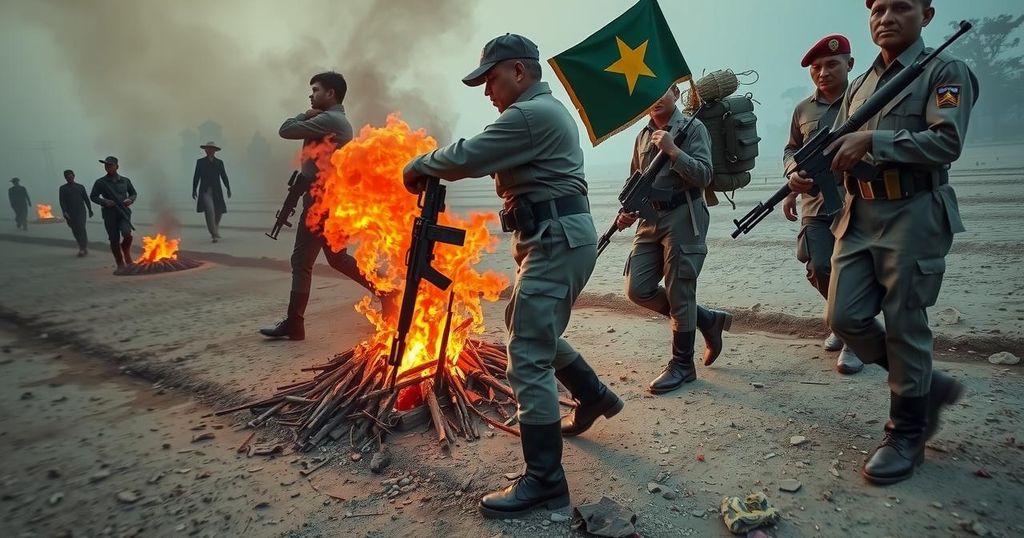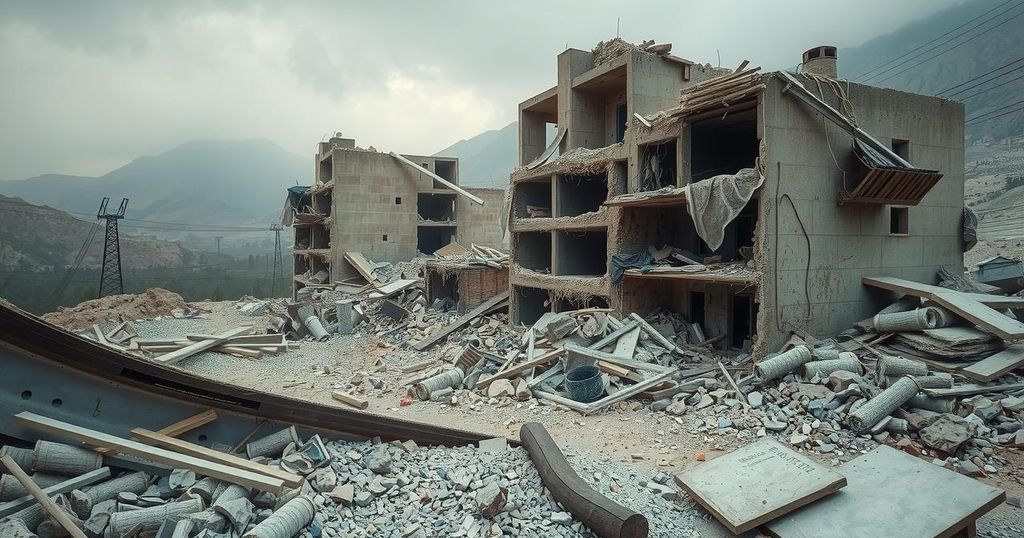Myanmar’s Civil War: Regional Destabilization and India’s Strategic Dilemmas
Myanmar’s escalating civil war, involving over 300 armed groups, poses significant threats to India’s northeastern states through increased cross-border violence, drug trafficking, and potential refugee crises. India’s Act East policy faces serious setbacks due to Myanmar’s instability, complicating infrastructure projects. China’s strategic engagement in Myanmar raises concerns for India’s regional interests. As humanitarian and economic crises deepen, India must balance strategic and humanitarian responses while navigating complex geopolitical dynamics.
Myanmar is currently grappling with a civil war characterized by a fractured opposition and a precarious military regime, which has significant consequences for regional stability, particularly for India. A staggering 300 armed groups with diverse agendas are operating throughout the country, exacerbating security concerns along India’s northeastern borders due to rising cross-border violence, drug trafficking, and potential refugee inflows. India must navigate the dual challenge of safeguarding its borders and assisting in peace efforts in Myanmar, a task made arduous by the complexity of the conflict.
The conflict represents a critical impasse, as the military regime steadily loses authority to various pro-democracy, insurgent, and ethnic factions. The disunity among Myanmar’s opposition, comprising at least seven distinct frameworks, poses a significant barrier to establishing a cohesive political system. The National Unity Government (NUG), which intends to represent pro-democracy interests, struggles to assert legitimacy, while other significant ethnic armed groups, such as the Arakan Army, have solidified their stances. This lack of unified leadership hinders the potential for resolution without considerable shifts in political power.
The turmoil in Myanmar is spilling over into India, notably in regions like Manipur, where fears of violence and conflict escalation are growing. Drug trafficking has surged alongside the civil war, with northeastern India becoming a corridor for narcotics, especially methamphetamine, largely attributed to declining opium production in Afghanistan. In response, India has heightened border security measures to mitigate these risks, including stringent protocols to screen refugees and combat the infiltration of armed individuals affiliated with ethnic groups across the borders.
India’s strategic initiative, known as the ‘Act East’ policy, emerges as another victim of Myanmar’s instability, with critical infrastructure projects such as the Kaladan Multi-Modal Transit Transport Project facing delays due to escalating security threats. Cooperative engagements with ethnic armed groups complicate progress on these projects, while the overarching goal of promoting regional democracy is challenged further by the disunity within the opposing factions in Myanmar.
The humanitarian crisis in Myanmar continues to worsen, with millions displaced under dire circumstances. Observers remain skeptical about the military’s recent efforts towards peace, regarding them as tactical maneuvers aimed at weakening opposition forces. As economic conditions deteriorate, inflation rises, and purchasing power dwindles, non-state actors dominate the border trade, largely perpetuating the ongoing conflict.
China has become a significant stakeholder in Myanmar, deploying a multi-faceted strategy that includes supporting the military while also engaging with ethnic factions. Its investment interests in Myanmar make it imperative for China to facilitate stability through various joint security initiatives. However, this dynamic stirs concern for India, as China’s increasing influence could undermine India’s strategic interests and regional objectives.
India’s approach to Myanmar remains cautious. While criticism of its perceived inaction persists, Indian officials maintain that India is prepared to assist should it be required. The lack of a formal refugee policy, however, complicates its response, with refugees often categorized as ‘illegal migrants.’ To ensure a balanced response that respects human rights and addresses security, a national refugee law could prove beneficial.
The geopolitical implications of Myanmar’s civil war are profound, affecting regional dynamics and alliances. ASEAN’s inability to adopt a unified approach to the crisis limits its capacity to mediate effectively. Furthermore, the necessity for India to reassess its strategies becomes evident, especially in light of China’s deepening role.
While outright victory for either side in Myanmar appears increasingly improbable, there are indications of potential negotiation openings. International diplomatic frameworks, such as ASEAN’s five-point consensus, may offer pathways to dialogue, contingent upon the willingness of those engaged in the conflict. Understanding the complex dynamics at play is essential for India, which can benefit from collaborating with think tanks and regional experts to develop strategic responses that promote both stability and regional interests.
The ongoing civil war in Myanmar has reached a critical juncture, impacting not only the nation itself but significantly affecting regional stability, particularly for neighboring countries such as India. As various armed groups vie for power amidst a fragmented opposition, the internal conflict poses significant security threats, including rising cross-border violence and an increase in drug trafficking and potential refugee crises. Amid these challenges, Myanmar’s complex political landscape necessitates a careful and strategic response from India, which aims to navigate its own interests while fostering regional peace.
In summary, Myanmar’s civil war poses considerable challenges for both the nation and its neighbors, particularly India, which must balance strategic interests with humanitarian concerns. The ongoing instability in Myanmar directly impacts India’s northeastern states, raising security concerns related to violence and drug trafficking. India’s approach to the conflict involves cautious engagement, while the need for a coherent refugee policy and a reassessment of regional strategies becomes increasingly urgent. Collaborative efforts and a nuanced understanding of the crisis are crucial as India seeks to play an active role in promoting stability and peace in Myanmar.
Original Source: www.socialnews.xyz








Post Comment